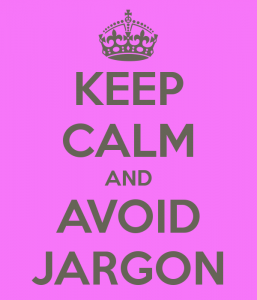
PR pros can be a verbose bunch. There’s nothing wrong with that. After all, the communications field doesn’t exactly cater to wallflowers. Then again, there are some words and phrases that have been ground to dust, and PR pros should finally give them a rest.
> To be honest with you: What, does your normal way of communicating tend to be dishonest? By invoking this term you’re sending a few signals, none of them positive. First, it comes off as groveling to whomever you’re talking to, as if you’re being candid only to this particular person while the great unwashed get scripted responses from you. What’s more, the phrase comes off as if you have a torturous relationship with the truth and need to advertise that you are being straightforward, as opposed to speaking in a way that comes off naturally and doesn’t need a preamble.
> Moving forward: This makes every PR pro sound like a backslapping politician who wouldn’t know legislation if it fell on him. Is there any place else to go, but forward? Who has ever been in the business of moving backward?
> Frankly: This is the worst kind of verbal crutch and, in a similar vein of “To be honest with you,” smacks of insincerity. Again, it’s a verbal tic in which the person saying it comes off as rather high and mighty while the people being spoken are often made to feel like they may not understand what’s being said and need the assistance of hand puppets to follow what’s being communicated.
> Value proposition: And what else should PR pros pitch to their clients or the C-suite? A lack of value? This term, no doubt invented in the corridors of B-Schools, is popular in boardrooms, but so are flat soda and soggy sandwiches. The term doesn’t mean anything. It has all the warmth of Ebenezer Scrooge on Christmas Eve. Lose it.
> Synergy: Pardon us while we get our pagers out. This term was a catchall phrase in the late 1990s to describe all the wonderful melding of companies, products and services, starting with the AOL-Time Warner merger. (We all know how that worked out.) In the last several years, the term has been eclipsed by “integrated marketing,” but we don’t know if that’s any better. The larger point is not to get seduced by words that sound highfalutin but are, in fact, dated.
When it comes to the various facets of PR and communications, describe what you’re going to do in clear, simple and effective terms and leave the buzzwords at home.
Follow Matthew Schwartz: @mpsjourno1

Great list. In every media training I’ve received, I’ve also been told never to say, “That’s a good (or great) question.” What, all of the other questions were dumb?
In the vein of “Let me be honest with you,” I used to work with a spokesperson who had a unique way of letting people know he was going to be brutally honest. Whereas you and I would indicate that we were going to “lay the cards on the table.” Dave would state that, “It’s time to let the ugly aunt out of the attic.” That always got a chuckle.
Hahaha that’s amazing, Gary! I’m going to start using, “It’s time to let the ugly aunt out of the attic.” So good.
*hollering* at “let the ugly aunt out of the attic” LOL!!!
Oh, this was awesome, Matthew! I never did like “To be honest with you,” & you’re right, “synergy” is indeed played-out. I laughed so hard with your pagers comment. Ah, I remember SkyGram. LOL
Lastly, lose that annoying “Keep Calm” meme. Ugh! LOL
Dude, like, totally awesome. All way awesomely overused.
All good, although I take exception to your full frontal attack on “value proposition,” – which, by the way, did not originate in the halls of b-schools, but in philosophy. You’ll find references to it at least back to the 1930’s. You’ll also find countless books which use the phrase even in the title. No, “value proposition” has a very significant meaning. It’s true, it’s misused, overused, and abused – but that’s not just cause for purging it from our wortschatz. While it has a close relation to USP or UVP (Unique sales or value proposition) – it also demands of the marketer that they see the world through the eyes of the customer. And from THEIR angle, what is the significant value that this brand provides?
But then again, I’m not that fond of Christmas, either.
I could add a lot more to the list, but I know you wanted to be succinct. When I was doing tech PR, I’d bang my head against the wall whenever I read a CEO quote that said, “We’re so excited about our new product!” When have you ever heard a CEO use “excited” to announce a new product?
I also cringed when I’d see “Cutting edge,” “robust,” “market leading,” and all the other meaningless descriptive phrases. Don’t tell me it’s cutting edge unless you can really describe why it’s ahead of its time. And in that case, I’ll figure out for myself that it’s cutting edge.
Far too many news releases are packed with meaningless generic phrases. If you can remove your company or product name from the release and easily insert a different one, then you’ve got a real problem with originality.
Use your words! But only if they’re well-chosen.
So glad I don’t see any of those, but I certainly hear #1 and think so is everything else a lie? LOL